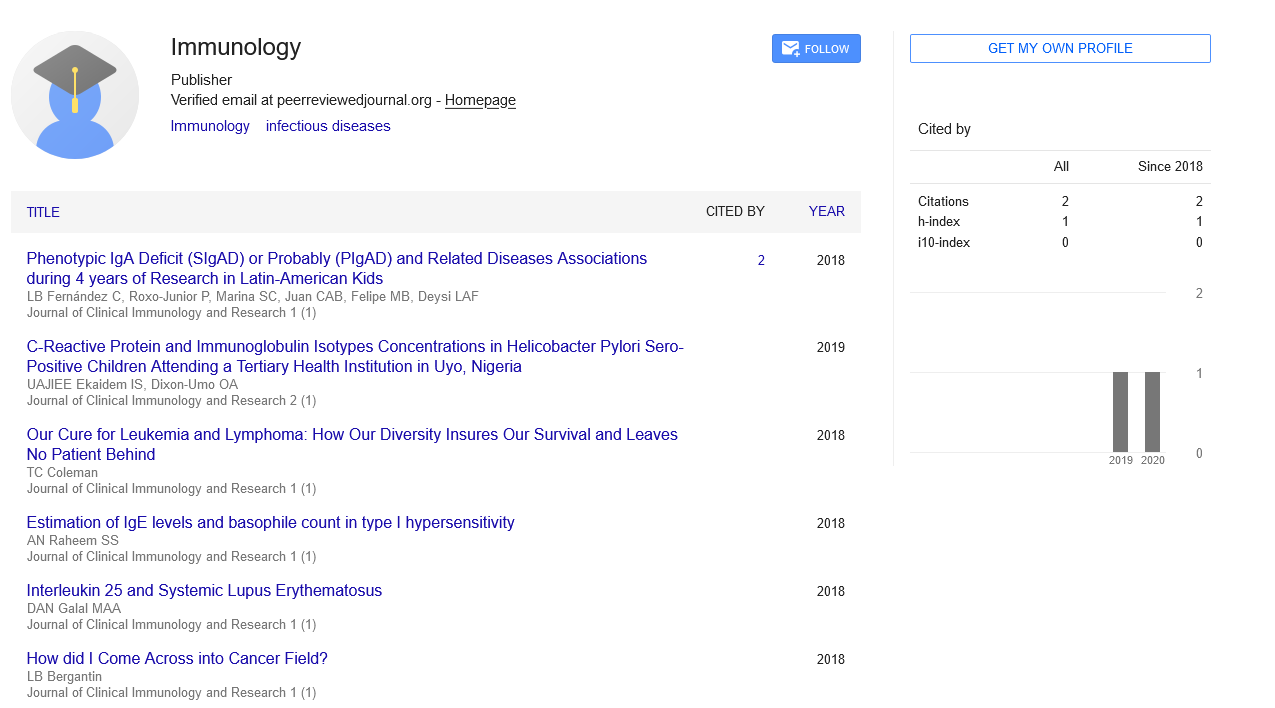Commentary, J Clin Immunol Res Vol: 6 Issue: 2
Optimizing Immune Health through Nutrition
Eddie Tran*
1School of Exercise and Nutrition Sciences, Queensland University of Technology, Queensland, Australia
*Corresponding Author: Eddie Tran,
School of Exercise and Nutrition Sciences,
Queensland University of Technology, Queensland, Australia
E-mail: traneddie@gmail.com
Received date: 15 May, 2023, Manuscript No. JCIR-23-104715;
Editor assigned date: 17 May, 2023, PreQC No JCIR-23-104715(PQ);
Reviewed date: 01 June, 2023, QC No. JCIR-23-104715;
Revised date: 08 June, 2023, Manuscript No. JCIR-23-104715(R);
Published date: 16 June, 2023, DOI: 10.4172/JCIR.100077
Citation: Tran E (2023) Optimizing Immune Health through Nutrition. J Clin Immunol Res 6:2.
Abstract
Description
The immune system serves as our body's primary defense against infections, diseases, and other harmful invaders. While maintaining a healthy immune system involves various factors, including regular exercise and adequate sleep, diet plays a important role in supporting immune function. By providing essential nutrients, vitamins, and minerals, a well-balanced diet can strengthen the immune system, helping it function optimally.
The role of nutrients in immune health
Proper nutrition is essential for maintaining a robust immune system. Various nutrients play vital roles in supporting immune function:
Vitamin C: Known for its antioxidant properties, vitamin C boosts immune cell activity and enhances the production of antibodies.
Vitamin D: This vitamin regulates immune cell function and is important for maintaining a strong immune response.
Zinc: Zinc is involved in the development and function of immune cells and helps to regulate inflammation.
Omega-3 fatty acids: These healthy fats reduce inflammation and support immune cell function.
Probiotics: Beneficial bacteria found in probiotic-rich foods help maintain a healthy gut micro biome, which is important for immune health.
Antioxidant-rich foods: Antioxidants help protect the body's cells from damage caused by free radicals, which can weaken the immune system. Consuming antioxidant-rich foods, such as berries, citrus fruits, leafy greens, and nuts, can boost immune function and reduce the risk of chronic diseases.
Protein and amino acids: Protein is essential for immune cell production, repair, and function. Including high-quality protein sources, such as lean meats, fish, eggs, legumes, and dairy products, in the diet ensures an adequate supply of amino acids needed for immune cell development and antibody production.
Immune-boosting vitamins and minerals: Apart from vitamin C and vitamin D, several other vitamins and minerals are needed for immune function. Vitamin A, found in colorful fruits and vegetables, helps maintain the integrity of the skin and mucosal surfaces, acting as a barrier against pathogens. Vitamin E, found in nuts, seeds, and vegetable oils, supports the activity of immune cells. Selenium, present in Brazil nuts, seafood, and whole grains, enhances immune response. Including a diverse range of fruits, vegetables, whole grains, and nuts can provide a broad spectrum of immune-boosting nutrients.
Importance of a balanced diet: While specific nutrients are essential for immune health, it is important to maintain a wellbalanced diet overall. A diet rich in whole, unprocessed foods provides a variety of nutrients, vitamins, and minerals necessary for optimal immune function. Consuming a wide array of fruits, vegetables, whole grains, lean proteins, and healthy fats ensures a diverse nutrient profile, supporting overall immune health.
Hydration and immune function: Proper hydration is often overlooked but is important for immune function. Staying hydrated helps maintain the integrity of mucosal surfaces, which act as barriers against pathogens. It also supports lymphatic circulation, allowing immune cells to travel efficiently throughout the body. Aim to drink an adequate amount of water and include hydrating foods such as soups, herbal teas, and fruits with high water content.
Conclusion
Supporting immune health through a well-balanced diet is an essential aspect of maintaining overall well-being. By consuming a variety of nutrient-rich foods, including immune-boosting vitamins, minerals, and antioxidants, individuals can provide their bodies with the necessary tools to fend off infections and diseases. While diet alone cannot guarantee immunity, it is an integral part of a holistic approach to a healthy lifestyle. Embracing a nutritious diet, along with other healthy habits, can fortify the immune system and promote longterm health.
 Spanish
Spanish  Chinese
Chinese  Russian
Russian  German
German  French
French  Japanese
Japanese  Portuguese
Portuguese  Hindi
Hindi 